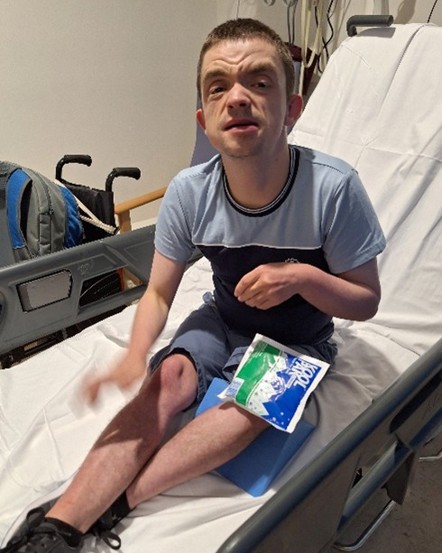No Longer Alone: Finding Another SMS Family

Tina McGrevy
Tina McGrevy lives in the Midwest with her husband Charlie and their three sons: Garrett diagnosed in 2001 with Smith-Magenis Syndrome (SMS), Patrick ...
Rare is an understatement.
When he was diagnosed at 18 months, there were less than a thousand known cases. And I mean in the entire world.
“What are his symptoms?” she persisted.
“Well, the most difficult part of it is an inverted sleep cycle,” Charlie told her.
She nodded, but few people really understand how screwy the sleep pattern is for people born with Smith-Magenis Syndrome (called SMS).
“Garrett’s body releases melatonin during the daytime, so he falls asleep easily.” I felt the need to tell her just how bad our life was…that it was more than “he took a little nap” kind of inconvenience.
“He falls asleep on the bus ride to school. He falls asleep while eating his peanut butter sandwich at lunch. He can even fall asleep, standing up and brushing his teeth at bedtime.
But the really weird part is that he is unable to stay asleep.” She kept nodding in an understanding way. It was time for me to pull out the big one.
“Last November, Garrett woke up in middle of the night. It was 3am and the rest of our family did not hear him get up and walk out the front door.
Our neighbor was leaving for work and he noticed Garrett standing in the driveway.” “Wow." she exclaimed. “What did you do?”
“We attached alarms on the all doors and installed a motion detector in the hallway.
Garrett even wears a transmitter bracelet from the Sheriff’s Department. If we ever really lost him, they could use that transmitter to narrow the search.”
I could feel that familiar lump in my throat and I blinked back the tears. I tried to remind myself that I did not have to be on the defensive.
What could be a more supportive environment than a “support group”?
Still, it was difficult to admit that we needed help from strangers just to keep our son safe.
I took a deep breath. “Another challenge of SMS is the result of a decreased sensitivity to pain. This may sound horrific,” I tried to warn her, “but many of these children bang their heads, bite their hands and even tear off their fingernails.”
The tears began to well up in her eyes. She did not ask any more questions, but I was on a roll. “Also, we deal with explosive outbursts, obsession and compulsion issues, and autistic-like aversions.
He gets very upset if “the routine” has an unexpected change.”
“Zan does that,” she whispered. “This sounds so much like my daughter’s son.”
What are the chances?
Was it possible that in our town of 65,000 people there could be two SMS children?
Another SMS mom I could meet for coffee, rant on the phone or ask for advice? It seemed too good to be true.
Our first pediatrician insisted we were nervous parents, but Charlie and I could not shake the uneasy feeling something was wrong with our baby.
When Garrett was eighteen months old and not yet walking, we found a doctor who took our concerns seriously.
The new pediatrician ordered genetic testing at our very first appointment and we received the results three weeks later. A “FISH test” of Garrett’s DNA found a tiny deletion in the 17th chromosome.
The diagnosis was Smith-Magenis Syndrome. Garrett’s “normal” life ended in that exam room but, worst of all, our family was completely alone.
We spent months feeling sorry for ourselves.
Finally, we found a website dedicated to Smith-Magenis Syndrome that was sponsored by PRISMS (Parents and Researchers Interested in SMS), an organization that families affected by SMS can turn to for support and understanding about the struggles unique to our lives.
PRISMS had produced a DVD called “The SMS Journey” with footage of other SMS children exhibiting Garrett’s behaviors. Finally, proof it was not our poor parenting skills!
Charlie had wanted to share that PRISMS video with our local autism support group. Naturally, this began a discussion about Smith-Magenis Syndrome and the questions from Zan’s grandmother.
She recognized her grandson in Garrett’s SMS features: broad forehead, wide nose and cherub cheeks.
With shaking hands, I gave this lady the DVD to take to her daughter and I wrote my phone number on the back of the PRISMS brochure.
I always carry a pamphlet in my purse for any new therapist, specialist or educator entering into Garrett’s life. T
he following week, Charlie and I brought Garrett to the Dream Soccer Tournament at the park.
We knew Zan would be there and we heard him cheering as soon as we stepped out of our minivan. It was the same raspy “SMS voice” so familiar in our home.
I gasped and looked over at Charlie. “Don’t scare the parents off!” he laughed at me.
It was hard to contain my excitement when I finally saw Zan and knew without a doubt he had SMS.
Zan was walking across the field with that “SMS walk”, an unusual gait where the hips swing out with each step. Zan was laughing as he slapped his hands together.
It was a glimpse of Garrett six years into the future. As we walked towards the shelter house, I wondered how best to approach a complete stranger with my unsolicited medical advice.
Thankfully, I felt an instant connection to Zan’s mom, Robyn. She had already gone to the PRISMS website and knew as much about SMS as Charlie and me!
“I left the PRISMS pamphlet on the kitchen table,” Robyn told me. “Zan picked it up and pointed to the photo of a teenage boy and said, ‘Hey! That’s me!’ And it really DOES look like him. I’m in shock.
We have been looking for answers for so long.” Robyn said that she had just taken Zan to a geneticist six months earlier.
An expert had looked right into the face of Smith-Magenis Syndrome and had not recognized the symptoms.
I gave her the phone number at Columbus Children’s Hospital, the place of Garrett’s diagnosis. In the following weeks, Robyn waited anxiously for the test results.
She and I spoke on the phone daily. We discovered that Robyn had graduated from high school with three of my cousins.
For years, we went to the same hairdresser. At the time of Garrett’s diagnosis, our two families were living on the same road but at opposite ends of the county!
The only surprise that came with Zan’s SMS diagnosis was Robyn’s reaction to it. “Yes! My son has Smith-Magenis Syndrome!” she shouted into the phone. I couldn’t help but laugh.
“You don’t understand,” Robyn attempted to explain.
“This answers more than a decade of questions and self doubt.”
It seems the only thing harder than finding out your baby has Smith-Magenis syndrome is living thirteen years without that knowledge.


